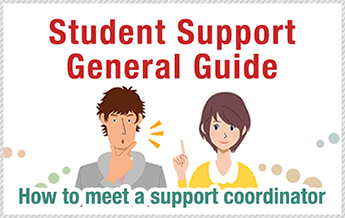Post list for「2020」
2020.12.23
How to release the facial tension
Masseter muscle massage
Masseter muscle is the muscle we use when chewing. It tenses when you clench your teeth, which you may do a lot when stressed. To release the tension:
Make a fist and put the flat part of your fist between the first and second finger joints on the masseter muscle.
Apply pressure and gently massage in circles to release tension.
Tip:
You may feel pain when it is tight. Gently release tension without straining.
Temple massage
Temporal muscle can be tensed when you use eyes looking at your PC or phone for a long time.
Make a fist and put the flat part of your fist between the first and second finger joints on your temple.
Apply pressure and gently massage in circles to release tension.
Find a spot that feels good, moving your hands.
Tip:
Try massaging the skull a little higher than the temple. You may feel your head cleared.
We do this exercise during the “Relaxation Time” the Student Support Room offers.
It is an easy exercise and also recommended in the cold season, as it makes your face warm.
2020.11.17
Mindful Breathing
Follow the audio guide to practice this mindfulness skill.
usually do. Observe the rise and fall of your chest and belly.
Pay attention to the breath coming in and out as if you were
broadcasting.
do not deny or push them away. Just gently acknowledge their
presence and bring your attention back to the breath. By practicing
bringing attention back, you will be able to focus on what you are
doing without being occupied with harmful thoughts or feelings.
2020.11.04
Take care of your lifestyle rhythm (sleep, eating, and exercise)
2020.11.04
Mindfulness
2020.10.19
10-second breathing technique
2020.09.24
How to cope with your stress
2020.07.17
Normal reaction to an abnormal situation ~ How to maintain our mental health ~
2020.07.17
How to Manage Your Mental and Physical Health during the Coronavirus (COVID-19) Pandemic
|
Anxiety about unknown stress |
Currently, COVID-19 is still completely unknown. |
|
Feelings of loneliness and distress due to limited contact with people |
Everyone wants to be with someone when times are difficult. However, it is required to maintain social distance from people in the current situation. People may feel depressed and lonely due to this restriction. |
|
The TMI (too much information) |
There is a tremendous amount of information about COVID-19, and it is important to have accurate and up-to-date public health information about this topic. However, too much information can make you more likely to become upset or anxious. Also, there is a risk that you will find some scientifically unfounded information. You may feel more insecure if you access information recklessly. |
What's New
- 2023.12.05 How to Deal with Negative Thinking
- 2022.12.07 Relaxation Techniques
- 2022.05.24 For the better stress management ~Tips from the Student Support Room~
- 2022.05.24 Suwaishou
- 2021.07.14 What are the Stress Coping Strategies that other students use?



